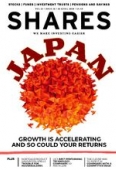Archived article
Please note that tax, investment, pension and ISA rules can change and the information and any views contained in this article may now be inaccurate.
A maths whizz reveals how he picks stocks

One of the market’s smaller UK funds at £64m is the somewhat unheralded FP CRUX UK Fund (B5839S6). Managed by CRUX Asset Management’s Jamie Ward, mathematics whizz, former equity analyst and sole manager since March 2018, the fund aims to preserve and enhance the real value of investors’ money over time.
While sentiment towards UK stocks is presently poor – and understandable given political uncertainties – the determined Ward isn’t worried about Brexit, being a long-term investor in ‘truly great businesses’ whose qualities should be rewarded over time.
FP CRUX UK Fund has generated 7.5% annualised returns over the past five years versus 6.9% from the FTSE All-Share total return index, according to Morningstar. Year-to-date the fund is up 11.6%.
THE INVESTMENT PROCESS
It has a high conviction, concentrated portfolio of 20 to 30 stocks of roughly equal weighting. Ward employs a rigorous screening process that poses three key questions: ‘Do we understand the business?’, ‘Is the business comfortably economic over the cycle?’, and ‘Do we trust the management?’
Companies that pass all three stages of this screen are evaluated for their characteristics and cash generation through the business cycle.
This process tends to lead to Ward owning companies with low capital intensity, consumer brands, strong balance sheets, barriers to entry and durability.
Typically, they are cash generative dividend payers, although dividend income isn’t the sole reason he invests in a stock.
EXPLOITING INEFFICIENCIES
Ward pursues a long-term, low-turnover approach that looks beyond short-term volatility to deliver dividend and capital growth.
He believes that price matters most. Buying companies at the right price – exploiting market inefficiencies to pocket them below their intrinsic worth – is the key to investment outperformance over time.
HOW DOES IT RESEARCH COMPANIES?
‘I try to be quite arm’s length,’ stresses Ward on the topic of meeting management teams. He feels this enables him to be objective in his assessment of the business.
Ward also uses the EV/IC valuation framework, an alternative version of the more commonly used price-to-book ratio, in which market cap is replaced by enterprise value and invested capital replaces net asset value.
EV/IC tells the investor the value or multiple the market is putting on each pound of capital invested in a company. He focuses on a company’s return on invested capital on a through-the-cycle basis, explaining he is not interested in what this figure looks like over the past five years, but how it averages out over the long term.
WHAT’S IN THE PORTFOLIO?
While there is a key focus on UK-listed companies, the fund also has the ability to invest up to 15% in stocks listed overseas which explains the presence of banking group JPMorgan Chase in the top 10 holdings.
Leading portfolio positions include global businesses such as GlaxoSmithKline (GSK), medical devices maker Smith & Nephew (SN.), oil major BP (BP.), banking giant HSBC (HSBA) and global catering play Compass (CPG).
Investee companies also include outsourcer Serco (SRP), which Ward claims to have been ‘horribly mis-managed’ before chief executive Rupert Soames took over and began to turn the business around.
Another position is PZ Cussons (PZC), the consumer products group behind brands including Imperial Leather soap and St. Tropez tan.
‘The Nigerian economy isn’t going great,’ explains Ward, ‘but in Nigeria PZ Cussons’ brands definitely have value.’ He describes the stock as an ‘underappreciated value’ name.
Albeit one of Ward’s poorest investments over the past few years, disappointments largely driven by difficulties in Nigeria, he recently wrote: ‘Shorter-term issues aside, we continue to believe that its current travails are transitory and the long-term strategic value of having strong brand values and distribution networks in demographically exploding regions is much higher than implied by the share price.’
In terms of sell discipline, it is never purely down to valuation for Ward and if a stock becomes too expensive, he says: ‘I’ll sell down but I won’t eliminate it.’
One stock no longer in portfolio is Greene King (GNK), added to the fund in the summer of 2017 at an average price of 667p and sold at an average price of 605p with a total of 66.4p per share of dividends received during the investment.
Ward was alarmed by the unexpected retirement of CEO Rooney Anand, saying ‘he is Greene King’. The fund manager believed its competitive position within the UK dining market was deteriorating and he was worried that the pub group’s real estate valuations look vulnerable to being downgraded.
Important information:
These articles are provided by Shares magazine which is published by AJ Bell Media, a part of AJ Bell. Shares is not written by AJ Bell.
Shares is provided for your general information and use and is not a personal recommendation to invest. It is not intended to be relied upon by you in making or not making any investment decisions. The investments referred to in these articles will not be suitable for all investors. If in doubt please seek appropriate independent financial advice.
Investors acting on the information in these articles do so at their own risk and AJ Bell Media and its staff do not accept liability for losses suffered by investors as a result of their investment decisions.

 magazine
magazine










